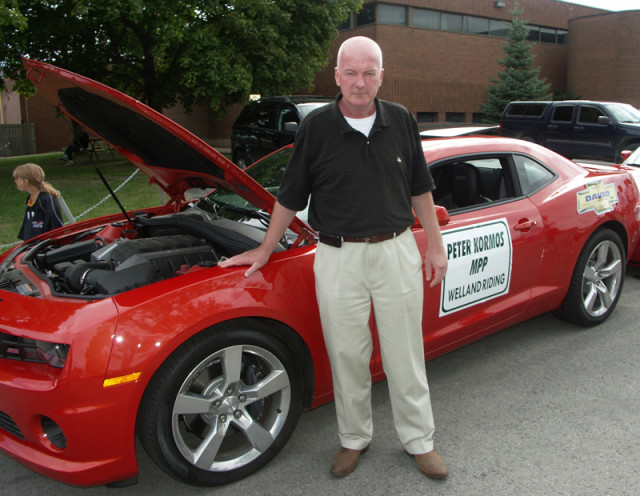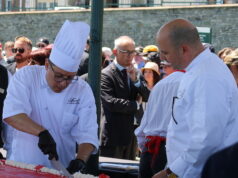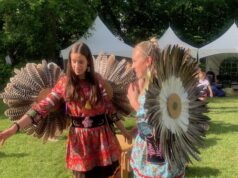(Mosaic Edition Sept Oct 2007)
Kormos-political pugilist of the voiceless
Peter Kormos has a star power. The Member of Provincial Parliament (MPP) for Welland Riding knows it. He has however used his high profile to fight for the common good of his community. He is one politician I have met since arrival in Canada who brought back the memories of my days as a political reporter. His interview was never a second of dead air.
After prepping him on the area of concentration, we launched into the interview. I informed him of the video recording taking place simultaneously, which is part of an upcoming documentary.
His interview was very candid, passionate and laced with sound bites mixed with quotes and aphorisms. The whole sixty minutes will be the delight of any broadcast producer in need of a punch line.
“I adhere strongly to the proposition that our job in a multicultural society is to enhance our diversity not to eliminate it,” he opens up. The MPP believes we have moved far beyond the concept of tolerating each other’s cultures.
“If you want to derive the good things, the strength, the richness, the qualities that can be obtained in a multicultural society we have to embrace each other’s cultures.”
MPP Kormos I discover in the first ten minutes of the interview was ready for whatever question I had in mind.
I digress. I should have told you that he came to the newsroom atop the Scott Vine Plaza in Dockers type khaki pants with the sleeves rolled to the elbow. His simplicity made me to change course. I yanked off my tie and dropped the formal wear.
“One of our jobs is to ensure that dominant cultures do not overcome other cultures, subvert them or convert them.”
“Culture is a complex thing. Culture is more than mere ethnicity. Culture is like the blossoms of a flower where they all join and reach out with huge overlap. Cultures mature, grow and respond to the circumstances they are in.”
The criminal lawyer turned lawmaker enjoys the food at various festivals but feels multiculturalism should move away from the food and festival approach.
“We have to become more cognizant of the bona fide value in not just a multicultural society but one wherein there is a concerted and group effort to sustain, protect and enhance multiculturalism.”
Peter Kormos is comfortable discussing race issues. Within the few months I have been reporting and interviewing guests on diversity and race issues, I have noticed that the topic is always not comfortable for some Canadians in position of power and bureaucracy. There is the attitude of ‘leave that alone’ or ‘we here have moved beyond that issue’.
The lawmaker regrets that various governments are not doing enough to have a diversified workforce.
“Our public and private institutions should have a complexion and picture that reflect the reality of the society to validate and legitimize those who have come to the country.” “When you leave your country and homeland it is with a great pain and you leave a whole lot behind,” he says.
“If we do not validate the identity of people in Canada we are doing those folks a disservice.
“Part of the ways to validate this is to have the image of the public institutions reflect the reality of the society whether it is the police force, ambulance drivers, city hall staff, city worker or even the private sector. We have to do that consciously.”
He explains that it is one thing to talk about multiculturalism but it is another thing to live it.
“There are times when cultures and values inheriting those cultures conflict and we have to learn how to resolve those conflicts.”
“You do not address that by flipping a coin and saying that one culture will surrender to the other. You do not allow one to dominate the other by use of its resources and the power of its size.”
Peter Kormos believes in the powers of listening and dialogue.
“Conflict will often arise and it would be naive to say it would never arise.”
“Conflict is good. From conflict better things can grow. We should try to listen to what the others are trying to tell us.”
He expresses concerns on how somehow the federal government has a pretty restrictive policy towards immigration.
“It is a huge country of about 31 million and a whole lot of land and space. It is heartbreaking when I see people and families who very much want to choose Canada as a place they want to live and raise their children have our federal government slap the doors on them.”
. The Welland politician has been a social activist believing in social justice since his teenage years.
He regards being an elected official an opportunity to fight for those things that would change people’s life and the society.
He sees himself as a spokesperson for those without a voice.
“Look, do the big banks need a voice? No they are doing fine. Do the big corporations need a voice? No. Do the working folks out there struggling on a daily basis sacrificing to put their kids through college and university need a voice? Yes I want to be their voice.”
Peter Kormos has a high profile in and out of Ontario. He admits he is not hesitant where necessary to use the high profile to advance people’s interest and make people’s life better in the community.
The lawmaker is very modest about the busy lobby of his legislative office in Welland.
He has three-hardworking staff on federal, provincial and immigration issues including refugee claims, humanitarian claims and unification of families.
“When you are successful you get more customers not just from the riding but outside the riding and across the province. I do not hesitate to raise issues in the legislature. I will talk about people and their families and the difficulties they are encountering.”
MPP Kormos wants Canada to do more and invest more resources on settling newcomers.
“There was a regrettable time in our immigration policy when someone with a bad eyesight would not be allowed in the country and families were broken up.”
He describes the restriction placed on newcomers to medical resources as unfair.
On diversity, the lawmaker wants elected bodies to reflect the reality of the community.
“I encourage new Canadians to not only exercise their right to vote but right to contest elections. They can start at the local school boards and work themselves up.”
“I think it’s important that newcomers get involved even before they become citizens.”
“There should be no us and them it should be we.”
(Edward Akinwunmi, Mosaic Edition 2007)
Editor’s note.
Peter Kormos passed March 30, 2013 (aged 60)










